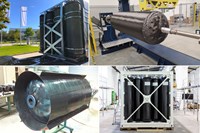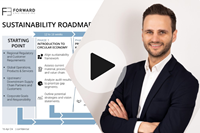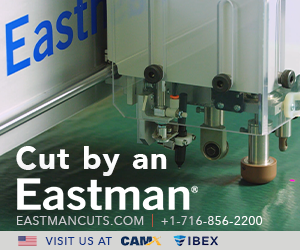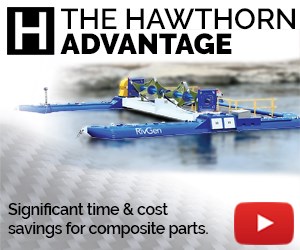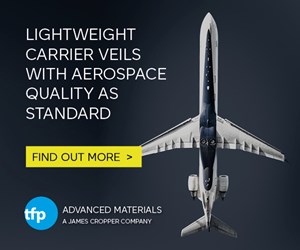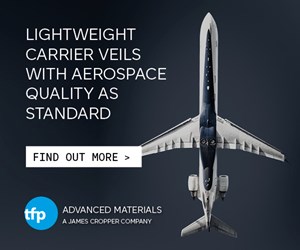Candela secures €24 million investment to scale production of foiling vessels
Hydrofoiling electric boat maker expects to triple R&D, invest in production automation and scale up production of electric boats, which comprise carbon fiber foils.
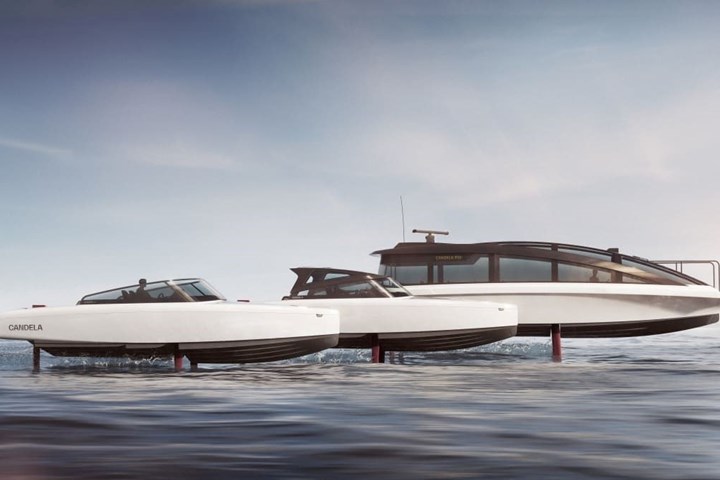
Candela's product lineup with the Candela C-8 DC leisure boat, the C-8 Hardtop and P-30 foiling commuter ferry. Photo Credit: Candela
On Dec. 8 tech firm Candela (Lidingö, Sweden), known for its composites-intensive long-range electric boats (see CW’s coverage in “Composites enable novel flying speedboat”) has announced that it has raised €24 million, led by EQT Ventures, with participation from existing investor Chris Anderson, the curator of TED. The new capital will boost the company’s already substantial cash influx from sales and will be used to triple R&D, invest in production automation and scale up the sales organization to meet demand for Candela’s electric leisure and commercial vessels worldwide.
Flying on underwater wings attached to the boat hull — known as hydrofoils — that are said to reduce energy consumption by 80% compared to conventional planing craft, Candela’s vessels offer two to three times longer endurance than the conventional electric powerboats. The active hydrofoil system stabilizes the vessels in-flight using computer power and advanced software that accounts for waves and side winds, allowing for a wake-free, smooth ride.
Since 2019, Candela reports that it has led electric boat sales in Europe with its foiling C-7 sportsboat. Now, the company is building on this success with the mass market Candela C-8, a day cruiser that the company has close to 100 orders for, just three months after launch.
The new investment will be used to triple Candela’s fast-growing R&D team that consists of leading engineers from the aerospace, software and electronics industries. Funds will also be allocated to complement the company’s Stockholm facility with an additional highly automated factory, which will produce the Candela C-8 alongside commercial vessels launched earlier this year: The shuttle ferry Candela P-30 — said to be the world’s first electric hydrofoil passenger vessel — and the water taxi Candela P-12.
By scaling its hydrofoil tech to commercial vessels, Candela envisions to have a big impact on CO2 emissions caused by fast coastal shipping, which make up 4-5% of the world’s annual emissions. By combining sustainability with lower operational costs, Candela foresees that the company’s electric passenger vessels will drive the transition away from ICE ships even faster than for leisure boats.
“We’ve shown that our hydrofoil tech is the key to make electric boats commercially viable,” notes Gustav Hasselskog, CEO of Candela. “We’re seeing boundless demand for the Candela C-8, as well as interest in our commercial vessels. The investment from EQT Ventures will allow us to double down on our mission to speed up the transition to fossil fuel-free lakes and oceans. It took us four years to develop the technology and two more years to master it. Now we are ready to scale up fast.”
Related Content
-
Materials & Processes: Fabrication methods
There are numerous methods for fabricating composite components. Selection of a method for a particular part, therefore, will depend on the materials, the part design and end-use or application. Here's a guide to selection.
-
Prefabricated composite panels, joining system ease catamaran construction
New Zealand-based G&T Marine reduces assembly and construction time with ATL Composites’ composite DuFLEX panels.
-
The lessons behind OceanGate
Carbon fiber composites faced much criticism in the wake of the OceanGate submersible accident. CW’s publisher Jeff Sloan explains that it’s not that simple.





